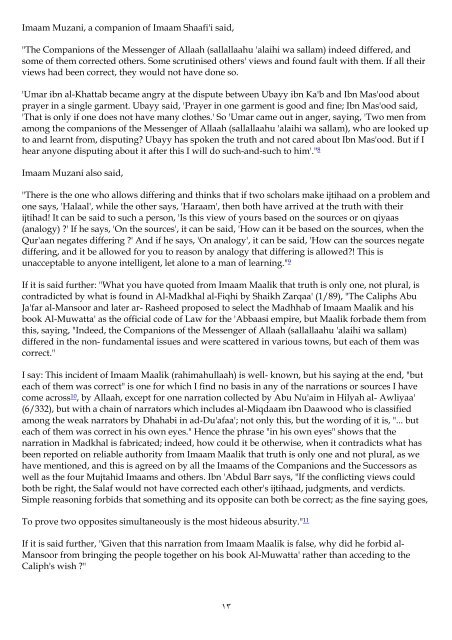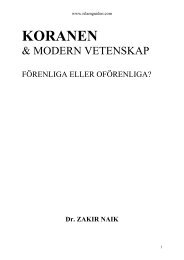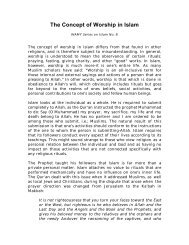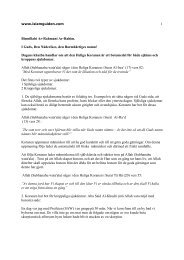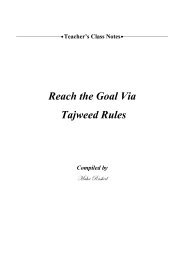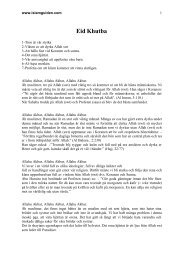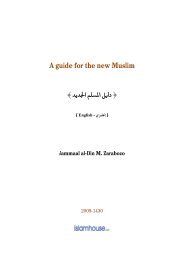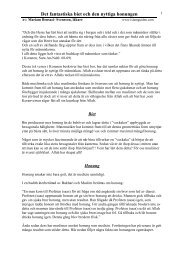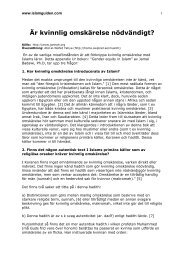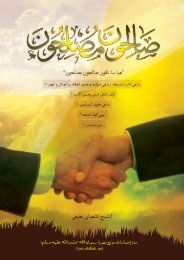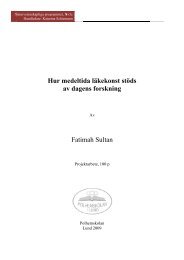The Prophet's Prayer From The beginning To The End As Though ...
The Prophet's Prayer From The beginning To The End As Though ...
The Prophet's Prayer From The beginning To The End As Though ...
You also want an ePaper? Increase the reach of your titles
YUMPU automatically turns print PDFs into web optimized ePapers that Google loves.
Imaam Muzani, a companion of Imaam Shaafi'i said,<br />
"<strong>The</strong> Companions of the Messenger of Allaah (sallallaahu 'alaihi wa sallam) indeed differed, and<br />
some of them corrected others. Some scrutinised others' views and found fault with them. If all their<br />
views had been correct, they would not have done so.<br />
'Umar ibn al-Khattab became angry at the dispute between Ubayy ibn Ka'b and Ibn Mas'ood about<br />
prayer in a single garment. Ubayy said, '<strong>Prayer</strong> in one garment is good and fine; Ibn Mas'ood said,<br />
'That is only if one does not have many clothes.' So 'Umar came out in anger, saying, 'Two men from<br />
among the companions of the Messenger of Allaah (sallallaahu 'alaihi wa sallam), who are looked up<br />
to and learnt from, disputing Ubayy has spoken the truth and not cared about Ibn Mas'ood. But if I<br />
hear anyone disputing about it after this I will do such-and-such to him'." 8<br />
Imaam Muzani also said,<br />
"<strong>The</strong>re is the one who allows differing and thinks that if two scholars make ijtihaad on a problem and<br />
one says, 'Halaal', while the other says, 'Haraam', then both have arrived at the truth with their<br />
ijtihad! It can be said to such a person, 'Is this view of yours based on the sources or on qiyaas<br />
(analogy) ' If he says, 'On the sources', it can be said, 'How can it be based on the sources, when the<br />
Qur'aan negates differing ' And if he says, 'On analogy', it can be said, 'How can the sources negate<br />
differing, and it be allowed for you to reason by analogy that differing is allowed! This is<br />
unacceptable to anyone intelligent, let alone to a man of learning." 9<br />
If it is said further: "What you have quoted from Imaam Maalik that truth is only one, not plural, is<br />
contradicted by what is found in Al-Madkhal al-Fiqhi by Shaikh Zarqaa' (1/89), "<strong>The</strong> Caliphs Abu<br />
Ja'far al-Mansoor and later ar- Rasheed proposed to select the Madhhab of Imaam Maalik and his<br />
book Al-Muwatta' as the official code of Law for the 'Abbaasi empire, but Maalik forbade them from<br />
this, saying, "Indeed, the Companions of the Messenger of Allaah (sallallaahu 'alaihi wa sallam)<br />
differed in the non- fundamental issues and were scattered in various towns, but each of them was<br />
correct."<br />
I say: This incident of Imaam Maalik (rahimahullaah) is well- known, but his saying at the end, "but<br />
each of them was correct" is one for which I find no basis in any of the narrations or sources I have<br />
come across 10 , by Allaah, except for one narration collected by Abu Nu'aim in Hilyah al- Awliyaa'<br />
(6/332), but with a chain of narrators which includes al-Miqdaam ibn Daawood who is classified<br />
among the weak narrators by Dhahabi in ad-Du'afaa'; not only this, but the wording of it is, "... but<br />
each of them was correct in his own eyes." Hence the phrase "in his own eyes" shows that the<br />
narration in Madkhal is fabricated; indeed, how could it be otherwise, when it contradicts what has<br />
been reported on reliable authority from Imaam Maalik that truth is only one and not plural, as we<br />
have mentioned, and this is agreed on by all the Imaams of the Companions and the Successors as<br />
well as the four Mujtahid Imaams and others. Ibn 'Abdul Barr says, "If the conflicting views could<br />
both be right, the Salaf would not have corrected each other's ijtihaad, judgments, and verdicts.<br />
Simple reasoning forbids that something and its opposite can both be correct; as the fine saying goes,<br />
<strong>To</strong> prove two opposites simultaneously is the most hideous absurity." 11<br />
If it is said further, "Given that this narration from Imaam Maalik is false, why did he forbid al-<br />
Mansoor from bringing the people together on his book Al-Muwatta' rather than acceding to the<br />
Caliph's wish "<br />
١٣


